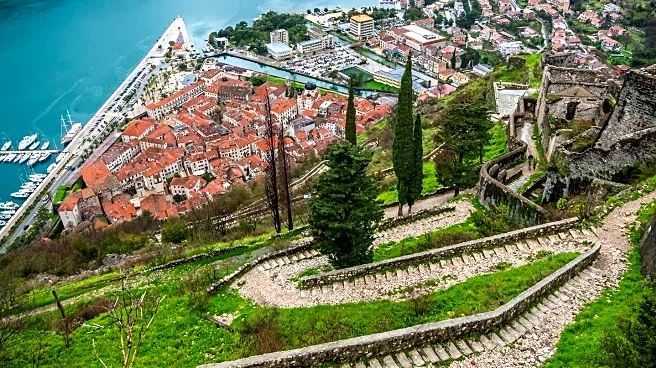What's Happening?
Montenegro, a small country on the Adriatic Sea, is gaining attention for its rich history and scenic beauty, particularly in the city of Kotor. Kotor, a UNESCO World Heritage Site, is known for its medieval architecture and Venetian piazzas. The city offers a variety of activities, including exploring ancient city walls, visiting natural wonders like the Blue Cave, and enjoying local cuisine and wine. Despite its small size, Kotor has a complex history, having been ruled by various empires over the centuries. Montenegro declared its independence in 2006, and its cultural influences are evident in its food, architecture, and language.
Why It's Important?
The growing interest in Montenegro, particularly Kotor, highlights the country's potential as a significant travel destination. This development could boost Montenegro's tourism industry, providing economic benefits and increasing international visibility. The country's diverse cultural influences and natural beauty offer unique experiences for travelers, potentially attracting more visitors and investment. As Montenegro continues to develop its tourism infrastructure, it may become a more prominent player in the Adriatic Sea region, competing with neighboring destinations like Croatia, Greece, and Italy.
What's Next?
Montenegro's tourism sector may see increased investment and development as interest in destinations like Kotor grows. The country could focus on enhancing its travel infrastructure, including airports and accommodations, to accommodate more visitors. Additionally, Montenegro may promote its lesser-known attractions, such as Lake Skadar National Park and seaside resort towns, to diversify its tourism offerings. As more travelers discover Montenegro's unique charm, the country may establish itself as a must-visit destination in southeastern Europe.
Beyond the Headlines
Montenegro's emergence as a travel destination may have broader cultural implications, fostering greater international understanding and appreciation of its diverse heritage. The country's history of political turbulence and cultural mingling could offer valuable lessons in resilience and adaptation. As Montenegro gains recognition, it may also play a more active role in regional tourism collaborations, contributing to the economic and cultural exchange in the Adriatic Sea area.










